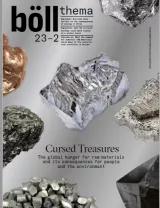Böll.Thema 2/23: Cursed Treasures
The restructuring of energy and transportation infrastructures is underway worldwide. The demand for critical and strategic raw materials such as copper, cobalt, lithium and rare earths will grow rapidly. In this issue, we discuss new dynamics in resource extraction, its impacts and, above all, opportunities for change.
Change is sorely needed: While the competition between the United States, China and the EU, as well as Russia, for access to resource-rich countries has become fiercer, people and civil society organizations in many places are fighting back against resource extraction and for fairer rules, because their livelihoods are being destroyed and their future is threatened.
We – the Heinrich Böll Foundation and its partner organizations – support them in this fight, for instance by providing legal assistance and through public relations work. This publication is intended to provide insights into this important topic.
As far as the raw materials partnerships of the European Union and Germany are concerned, one thing is clear: They must be designed in a way to avoid environmental damage and achieve greater social benefits in the resource-rich countries, for instance through new mining methods, more employment, processing capacities and redistribution and through respect for human rights. Restrictions must continue to be placed on mining in general: The deep sea must be declared off limits, as must headwater and biodiverse regions. The local communities must be involved in prospecting and in the approval process of new mining projects. It is also essential, however, that we reduce our consumption of raw materials altogether – by means of more durable and repairable products, recycling and new usage patterns such as sharing. This, too, is part of what we are working for – hopefully alongside you and with your support.
Product details
Table of contents
Editorial
Imme Scholz
Where we stand
On a new and intelligent use of resources
Von Johanna Sydow
Dossier
The great race for resources
It often goes hand in hand with human-rights violations, and its ecological costs are high. Yet other concepts do exist.
An overview by Heike Holdinghausen
Statement
Patching, soldering, fixing
Repairs must become easier and more affordable again.
by Katrin Meyer
Feature Interview
“You cannot just use up a country’s entire natural capital.”
Activist Sara Larraín on the consequences of mining in Chile, the limits of our consumption and an attitude characterized by respect and cooperation
Interview: Johanna Sydow
Smelters and Refineries
The bottleneck in supply chains
The EU plans to further expand its domestic capacities in order to reduce dependence on China.
by Melanie Müller and Lea Strack
Mining in Europe
In the spotlight: Europe’s resource-rich countries
How do their civil societies feel about the run on raw materials on their doorstep?
Recorded by: Heike Holdinghausen
Faces of Change
Fighting for stolen land Activists from six countries on their fight against mining companies and the overconsumption of resources.
Health
The case of Espinar
Cusco, Peru National institutions are failing to manage the consequences of industrial mining, which endangers the lives of hundreds of children, men and women.
by Vanessa Schaeffer and Mattes Tempelmann
Due Diligence
From nice-to-have to legal obligation
The German supply chain act is a step forward and the ongoing negotiations on a European equivalent also offer hope – but these laws alone will not be enough.
by Johanna Sydow
External Audits
“Companies cannot just delegate their responsibilities.”
Matthias Baier on his experiences as head of the German Competent Authority - EU Due Diligence Obligations in Mineral Supply Chains
Interview: Claudia Müller-Hoff
Prosecution
“Ending corporate impunity requires international agreement.”
Erika Mendes of Justiça Ambiental in Mozambique advocates for an agreement at UN level.
Interview: Johanna Sydow
Value Creation
Shaping value creation to be ecological and socially just
The new German raw materials policy must ensure that resource-rich countries can benefit from their wealth.
by Franziska Brantner
Indigene Rechte
Theoretisch geschützt, praktisch ausgebeutet
Die Rechte indigener Gemeinden sind international anerkannt und verankert. Trotzdem werden sie bei Bergbauprojekten halbherzig beachtet oder sogar systematisch ignoriert.
Von Ingrid Hausinger
Folgeschäden
Rauchsäulen, Resistenzen und Ruinen
Länder, die Rohstoffe abbauen und importieren, müssen klare Standards benennen, um für die Folgen ihres Bergbaus geradezustehen.
Von Andrés Angel
Wirtschaftsmodelle
Der Weg zu einer global gerechten, zirkulären Wirtschaft
Jan Kosmol, Dr.Alexander Janz und Prof. Dr. Dirk Messner zeigen, wie er funktionieren könnte
Recycling
Kreislaufwirtschaft
Recycling ist nur der drittbeste Weg. An erster Stelle müssen unter anderem alle Optionen zur Wiederverwendung und Vermeidung von Abfall ausgeschöpft werden.
Von Luisa Denter und Johanna Sydow
Verkehr
Ein gangbarer Weg
Zentral für eine Verkehrswende wäre, die Abhängigkeit vom Auto zu beenden und Radfahren und Zufußgehen auch in den Städten zu fördern.
Von Alejandro Gonzalez
Das letzte Wort
Wenn der Wald gewinnt
Von Elisabeth Weydt
